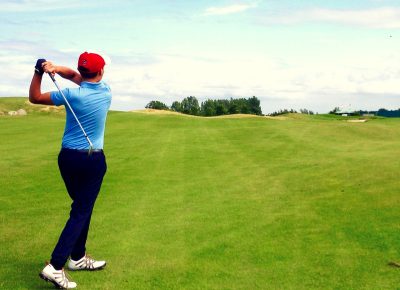Monthly Archives: September 2019
Golf and Rotator Cuff Injuries

It’s inevitable – If you’re an avid golfer, you have probably experienced some type of shoulder pain. As one of the most common complaints evaluated in the world of sports medicine, shoulder pain is frustrating and uncomfortable, but gaining a comprehensive understanding of why and how the pain develops can help you move past injury.
The most common structure at the root of shoulder pain is the rotator cuff. The rotator cuff is comprised of four different muscles that originate on the shoulder blade and attach to the head of the humerus, otherwise known as the upper arm bone. The rotator cuff has two essential jobs. First, it helps keep the arm bone centered in the main shoulder joint. This is important because the main joint, the glenohumeral joint, is very shallow and unstable due to its shape. Think of it as a golf ball on a tee. Secondly, the rotator cuff allows the arm to move in different directions. Each muscle contributes to either rotating the arm in place or moving it away from the body.
The functions of the rotator cuff are important components of the golf swing. Additionally, the rotator cuff has the ever-important responsibility of transferring the body’s force from the torso to the arms and down into the club. Golf is similar to many other sports in that power truly generates from strong hip and core rotation. Since the rotator cuff is the stabilizing force in the shoulder, it transfers this generated energy down into the arms. From there, it goes through the club and to the ball (hopefully sending it exactly where you need it to!).
While many people don’t realize it, rotator cuff injuries are very common for golfers. As with any athlete, the first question is always, “Can I continue golfing?” The answer is usually yes, but it ultimately depends on the type and severity of the injury. Injuries that cause limitations in range of motion, such as full tears and degeneration of the shoulder joint can make it very difficult to go through the full motion of a golf swing, so play may be limited. Less severe injuries, such as bursitis, tendinitis and partial tears, often allow for continued play with some treatments and swing modifications along the way.
Treatments for rotator cuff injuries include physical therapy and exercises to strengthen the rotator cuff and improve range of motion. Oral medications like ibuprofen or acetaminophen help reduce the pain and can be particularly effective prior to starting a round. Additionally, corticosteroid injections can be used for more severe pain and inflammation in the shoulder. Non-surgical treatments, such as regenerative medicine, can be effective in healing underlying injury as well and do not require going under the knife.
Modifications to your golf swing can also help to reduce shoulder pain such as shortening the backswing, which can reduce stress on the rotator cuff, or slowing down club speed to maintain a more relaxed swing. Golfers suffering from rotator cuff injuries may continue to play, but not at their best. Effectively and fully treating the injury can allow golfers to return to their peak performance and reduce the risk of further or permanent injury.
Dr. Brian Sokalsky is the physician at the helm of Jersey Shore Sports Medicine in Somers Point and Lanoka Harbor, New Jersey. Dr. Brian is a board-certified family physician with special training in sports medicine and utilizes treatment options at the forefront of non-surgical healing, as well as holistic approaches, to treat his patients. Whether treating a star athlete who was injured on the field, getting a weekend warrior back into the game, or counseling a patient on medical weight loss, Dr. Brian is known to take the thoughtful, disciplined and customized approach that makes the difference. Serving as an active member of the community, Dr. Brian provides game coverage to local high school sports teams and club rugby teams. To find out more or to schedule an appointment, call (609) 904-2565 or visit jerseyshoresportsmedicine.com.
